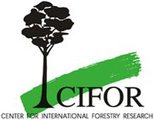CIFOR's newsletter links to numerous blog posting highlighting current activities by CIFOR, including preparations for Rio+20, the importance of documenting the values of biodiversity, and potential trade-offs and carbon co-benefits in land-use planning.
 28 February 2012: The Center for International Forestry Research (CIFOR) has released the February issue of its newsletter, which summarizes recent CIFOR publications and blog postings on biodiversity, sustainable development and climate change in the context CIFOR’s activities.
28 February 2012: The Center for International Forestry Research (CIFOR) has released the February issue of its newsletter, which summarizes recent CIFOR publications and blog postings on biodiversity, sustainable development and climate change in the context CIFOR’s activities.
In a post on the UN Conference on Sustainable Development (UNCSD, or Rio+20), CIFOR scientists note that forests are inadequately considered within the draft agenda Rio+20. CIFOR argues that this is remarkable, given the large emphasis on forests in the first Rio Summit. The post outlines seven key areas of Rio+20 that should consider forests. These areas include, jobs, energy, food, water, cities, oceans and disasters. CIFOR calls on countries to ensure greater integration of forests over the coming Rio+20 preparatory meetings.
In an article on biodiversity, forests and food security, the newsletter describes the importance of quantifying the contribution of forests to food security, nutrition and human well being. The article stresses that over one billion people rely on wild harvested products for food and income and that we are only starting to understand ecosystem services, supported by the underlying biodiversity. The article is one within a special issue of the International Forestry Review.
On REDD+ (reducing emissions from deforestation and forest degradation, and the role of conservation, sustainable management of forests and enhancement of forest carbon stocks in developing countries), an article highlights a new study on rubber plantations that stresses the need to consider biodiversity and rural livelihoods in climate change activities. It calls for greater consideration of carbon absorption of rubber plantations following shifting agriculture in Southeast Asia. The report stresses the need to influence the types of land-use changes that are occurring to support sustainable livelihoods and environmental services, including carbon.
In a science dispatch, a recent CIFOR study on, “The anatomy of large-scale farmland acquisitions in sub-Saharan Africa” analyses 353 large farmland projects between 2005 and 2011, finding that European investors are acquiring large areas of land to fuel long-term demand for alternative fuels. It notes that more recently, investors are coming from countries in South and Southeast Asia driven by a demand for food products, and given high price fluctuations, rising spending power and land constraints. The report describes efforts to curb threats, for example through host country sustainability policies and certification systems. It calls for exploration of complementarities between governance instruments like consumption standards, responsible financing policies, certification systems and host country policy frameworks.
A blog post on mining in the Congo Basin calls for a rejection of large scale gold and diamond mining, and instead focus on small scale mining to ensure that local populations continue to be motivated to preserve local forests. The post argues that small scale miners have small and limited impact, and rarely use harmful chemicals to extract metals. It underscores the weak institutions in many of these countries to govern mining. The blog post also links to related CIFOR publications for institutions and socioeconomic and environmental impacts of mining in the Congo Basin.
One post describes the exclusion of palm oil from the US Environmental Protection Agency’s (EPA) Renewable Fuel Standard program. It notes that biodiesel from palm oil does not meet the 20% greenhouse gas (GHG) reduction threshold needed to quantify as a renewable fuel. The post describes Malaysia’s and Indonesia’s concern with the EPA result and its lack of consistency with EU models. It highlights that the EPA is inviting public comments on its biofuel policy until 28 March. Biofuel growth and particularly palm oil has been a major contributor to land use change leading to carbon emissions in many countries. The post links to additional CIFOR publications from recent years on biofuels in Malaysia, social and environmental impacts of biofuel development in Indonesia, sustainability of EU-approved voluntary schemes for biofuels, and local social and environmental impacts of biofuels.
CIFOR is a member of the Consultative Group on International Agricultural Research (CGIAR). [Publication: CIFOR News Update February 2012]